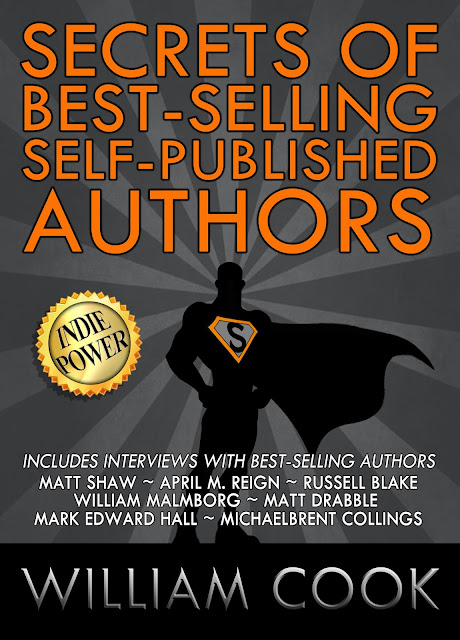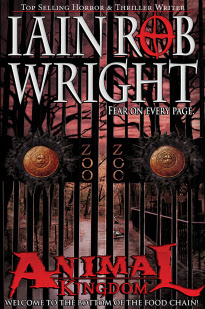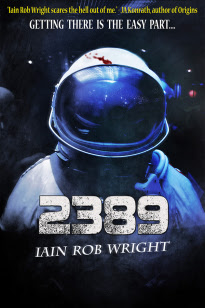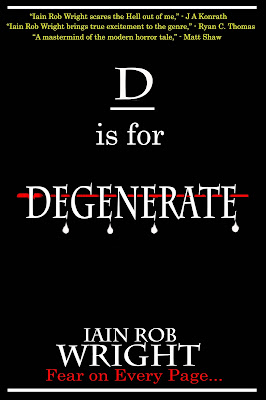The
previous interviews I conducted in the popular series, 'Secrets of
Best-Selling Self-Published Authors,' were such a hit with visitors to
this site I decided it would be crazy not to continue them. I have got
some wickedly good interviews lined up for you over the next month,
including VIP guest interviews from best-selling indie authors Iain Rob
Wright, Armand Rosamilia, David Moody, Jeremy Bates, Michael Bunker, J.
Thorn, Michael Bray, Michael J Sullivan, Ruth Ann Nordin and Michale
Thomas. If that wasn't enough, I hope to have a book from the first
series of interviews ready for release by the end of August. The book is
titled (surprise, surprise!) 'Secrets of Best-Selling Self-Published
Authors.' It contains all the authors interviewed in the first series
(Russell Blake, April M Reign, William Malmborg, Mark Edward Hall, Matt
Shaw, Michaelbrent Collings and Matt Drabble). Included in the book is a
lengthy analysis of their recommendations for self-published authors
and for those thinking of self-publishing, along with useful tips and
resources. The book will be available for pre-order early August and is
essential reading for those interested in self-publishing. Make sure you
subscribe now to get on the mailing list for all updates and new-release information.
Right, let's get into it. Today's special guest, is best-selling indie author, Iain Rob Wright. Iain is from the English town of Redditch, where he worked for many years as a mobile telephone salesman. After publishing his debut novel, THE FINAL WINTER, in 2011 to great success, he quit his job and became a full time writer. He now has over a dozen novels, and in 2013 he co-wrote a book with bestselling author, J.A.Konrath. The three most important things in his life are his wife, his son, and his fans. His work is currently being adapted for graphic novels, audio books, and foreign audiences. He’s an active member of the Horror Writer’s Association and a massive animal lover. Here's the interview:
Right, let's get into it. Today's special guest, is best-selling indie author, Iain Rob Wright. Iain is from the English town of Redditch, where he worked for many years as a mobile telephone salesman. After publishing his debut novel, THE FINAL WINTER, in 2011 to great success, he quit his job and became a full time writer. He now has over a dozen novels, and in 2013 he co-wrote a book with bestselling author, J.A.Konrath. The three most important things in his life are his wife, his son, and his fans. His work is currently being adapted for graphic novels, audio books, and foreign audiences. He’s an active member of the Horror Writer’s Association and a massive animal lover. Here's the interview:
Who are you and where do you come from? Do you think that your life
experience has gone some way towards making you a successful author in your
chosen genre?
I am Iain Rob Wright, a horror
author. What has helped make me a successful author is that I am a fan first,
writer second. My books are the things, as a horror fan, that I would like to
read.
Where do you get your inspiration from for your writing and for the
way you brand yourself as an author?
My inspiration comes from the
other people in my genre. I read a lot and learned to love horror from enjoying
the work of Stephen King, Richard Laymon, James Herbert and many more. I also
love movies and television, and get many ideas whenever I watch a particularly
original film. After watching Legion, I gained the idea for The Final Winter,
my debut novel.
If you could pinpoint one thing in particular that has grabbed
readers of your work, what would you say it is? I.e. what is it about your
books that keeps your readers coming back for more?
I think readers point out my
characters as the part they most enjoy. I reuse characters across multiple
books and like to have them change and grow. I also try to be original with my
ideas. All of my books are different and I don’t just write about one thing.
Your first book, ‘The Final Winter,’ was very successful – how did
you achieve such an impact with your debut novel and have you managed to
replicate it since?
I have no idea. I published it
and got a few sales, and then those sales kept increasing. What helped me in
the early days is gaining a couple of really amazing fans who recommended my
work a lot. They helped get my name around very quickly. A writer is nothing
without readers, so I was very lucky to get those early fans.
You have enjoyed best-selling status on Amazon and have had your
books adapted for Graphic Novels, Audio Books and foreign audiences – is there
a particular moment in your career as an author that you realized that you had
done something right to get where you are now? Can you pinpoint what it was
that spiked your success to date?
When I started earning more
from my books than I had been while working a full-time job. When I started
earning enough to pay all the bills I realized that writing was my “job” now
and not just a dream. Also, when I wrote a book with JA. Konrath, who I had been
a fan of before I was a writer, it was pretty amazing.
Did you try to get publishing contracts for your books early on
with traditional book publishers? If so, did you have any success there or if
not what was it that made you decide to self-publish the majority of your work?
My second book, Animal Kingdom,
was published by an American Press. Eventually I bought the rights back and
self-published it. I’ll let that speak for itself.
I noticed that many of your kindle titles are published under
the imprint of Dead Pixel Productions – is that your own publishing company or
a collective? Do you think it is important for self-published authors to
establish their own publishing company to publish their works? Do you think
that the same results can be achieved by a self-published author without
forming a publishing company?
Dead Pixel Publications is
something I have just become a part of. It is a collection of authors all working
beneath a single banner, dedicated to finding mutual success. It is very
important to have allies in this business and far easy to find success with
help. I’m always very happy to offer assistance so joining a group such as DPP
made sense to me. It’s not vital for an author to start their own publishing
group, but it is important to become a brand in their own right. Stephen King
is synonymous with horror because his name has become a brand. That’s what an
author should aim for.
Once you have decided that self-publishing might be your route, what
financial and artistic considerations should you keep in mind before you begin?
Do the best with
what you have. In the early days I did my own covers and editing. I made a few
sales and put that money into hiring artists and editors. As I earned more
money I hired better artists and editors. You can scale your business up, but
you will only get back what you put in. It hurts paying $500 to an artist, but
the cost will pay for itself when you reap additional sales.
What do you see as your most innovative promotional strategy?
Bookbub
is the current number 1
sales promoter, but I have been testing Facebook ads with mixed success.
The
biggest mistake I made in the last few years was not maintaining an
mailing list.
It’s a big focus for me now and it’s a big tool being able to email a
thousand
people each time I have a new release. Trying new things is the key to
success.
You look at guys like Hugh Howey, J.A.Konrath, and Mark J.Dawson, and
you see
that they all got rich by being the guy to hit upon something first.
Find the opportunities for yourself and you will reap maximum advantage.
If you are a
follower then you are forever chasing diminishing returns.
What
kind of marketing did you do to establish your author brand and what do you
think is the most successful marketing for self-published authors? Is there any
one thing that you have determined has helped you sell more books – i.e. could
you outline your path to establishing your brand and your most successful sales
method/s as?
Freebies
work best in the early days. People don’t like risking their money so take the
risk away for them and give them something for free. If they like your book
then you will gain a fan (which is worth far more than a single books sale).
The early days is all about getting exposure, so focus on that, not making
money. Once you have exposure you can flip things around towards making profit.
Set up a mailing list and give people free books for joining.
How
important are ‘series’ books to your success as a self-published author?
I’m
late to jump on the ‘series’ bandwagon and have only just started. I know,
from, other authors that their series are the most lucrative books they have,
so it seems a wise business decision to write books in a series rather than
stand alones. I intend to write a mix.
Do you
design your own covers? How important do you think cover design is to a
potential reader and how big a part do you think it has played in your success
to date?
Nope.
With the exception of my short stories, I never design my own covers. Artwork
is the first chance you get to catch a reader so why compromise? Get a
professional and look at the best sellers in your genre.
In your
opinion, is traditional publishing on the way out? Do you think that
traditional publishing can continue to keep up with the rise of
self-publishing?
No way.
Traditional publishing is just adapted but it will be just fine. It still turns
over billions of dollars each year and have all the big name authors. I think
over time the indie scene and ‘professional’ scene will be linked, in the same
way indie musicians gig on their own until a big label takes notice. I see that
the indie writing scene will eventually become a feeder for the Big 5 who will
start buying ‘brands’ rather than books. As long as authors are making money and
readers are getting books, who really cares?
Would
you ever consider signing all your books to a traditional publishing house or
will you always mange some of your titles yourself through self-publishing?
I
imagine I will eventually have some published and some released myself.
‘Hybrid’ seems to be the word of the day. I would sign over all my books if it
made sense for me and my family.
Have
you ever used free book promotions? Do you think they are a worth-while marketing
tool for self-published authors? If so/not – why?
Freebies are the best way to grab
new readers. I make heavy use of giveaways. It does devalue books slightly, but if a reader likes me then
they should hopefully have no problem paying for my books that are not free.
What avenues of self-promotion did you find to be most effective and
affordable? What’s the best ‘bang-for-your-buck’ advertising you have employed?
Bookbub
always makes me a profit when used in conjunction with Kindle Countdown deals.
Now that Kindle Unlimited has changed its payout scheme, I quite like being a
part of it. Facebook ads also work, but they are difficult to get right.
Do you
feel there’s a good sense of community within the self-publishing industry?
Yes, definitely, but there are
also a few arrogant assholes who try to spoil it. Some start to make a
little bit of money and start believing they are celebrities, but for the most
part, authors are very kind and generous people. Most of the favorite people
in my life are other authors on Facebook who I have never met in person. It’s
one of the perks of the job for sure to be a part of such a friendly community.
Was it always your intention to self-publish, or would you have
considered the traditional publishing route had the opportunity presented
itself?
I have always been open to
traditional publishing, but it is a business decision. My books have worth, and
if a publisher is willing to pay me what they are worth then they can have
them. Problem with traditional publishers is that they try to get away with
undervaluing author’s work. I have a traditional publisher for my German
titles, because they are giving me something I can’t do myself. Most English
language publishers can’t offer me anything I need.
What would you say is the single biggest advantage of deciding to
self-publish?
I love all the creative stuff, so
working on covers, layout, editing etc is really fun. I also enjoy the
closeness with my fans. When they are good to me I can be good to them-there’s
no 3rd party interfering.
How important do you think using social media is to market your
books, (and interact with your readers)? Has social media been crucial to you
achieving success as a self-published author?
It’s a pain in the behind and a
massive time-sap, but social media is the most powerful tool an author has.
It’s the best way to spread news, the best way to be contacted, and the best
way to give back. It’s what
separates the modern author from those in the twilight of their careers and
it’s becoming vital to success.
Are you
in regular contact with other self-published authors and how important was any
input you may have received early on in your career? Do you have a mentor
in terms of your self-publishing success – someone who may have inspired you to
‘give it a go’?
I have many friends in the same
sphere as me. I have J.A. Konrath’s phone number, and speak with many other
authors such as David Moody, Aaron Warwick Dries, Ian Woodhead, Scott
Nicholson, Mark J Dawson. I’ve had advice from Hugh Howey and Russel Blake. The
most helpful in my career (and in many other author’s) is the great
J.A. Konrath. A lovely man.
Where to from here? Are you currently represented by an agent and are you working
with any publishers on future projects?
Nope, no agent (except my
co-write with J.A.Konrath). I foresee that I will have an agent at some point.
I have just signed a deal with Egmont LYX who are a large German publisher. I
also have a couple of irons in the fire in regards to screen writers adapting
my books.
Can you
offer any advice to fellow writers if you could go back in time and “do it all
over?” What’s your top tip for other indie authors.
The
best advice to any author is to write as much as possible. It’s great gaining
fans on social media or running promotions, but the simple fact is that the more
books you have, the easy it is to make both fans and money. You will also
improve every time you release a book.
Finally, thanks for sharing your thoughts on self-publishing. Where
is the best place for readers to find your books?
At the moment, readers can take
advantage of a great offer on my website. If you sign up to my no-spam
newsletter you will get free copies of: The Picture Frame, Animal Kingdom,
2389, Sea Sick, and D is for Degenerate. Five books for free. My website address
is: www.iainrobwright.com or you can
go immediately to the sign up form by going here: http://eepurl.com/baDkyT
Cool
interview, huh? Make sure to click on the book covers to check out
Iain's great stories. And, of course, you'd be crazy to miss out on his
bunch of freebies when you subscribe
to his newsletter. Also, please share this post as much as you can and
remember to subscribe now to this website so you don't miss the next
amazing interview (see below for special subscription offer). Next
interview is with the brilliant Armand Rosamilia. Stay tuned.




















